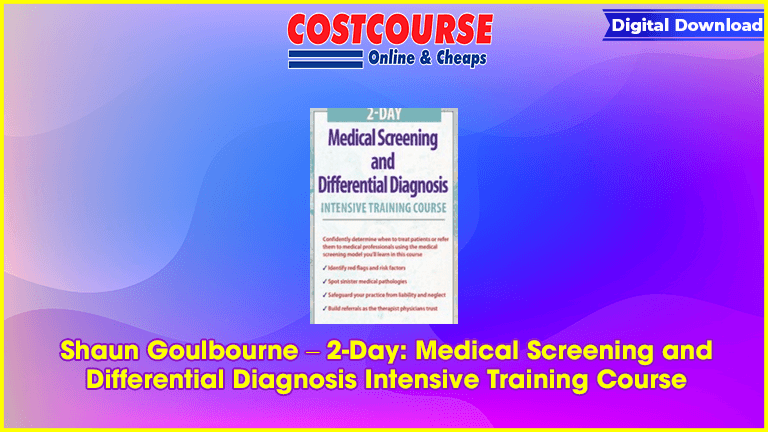Description
Your caseload is rapidly expanding as more patients skip the physician and go to the direct access route.
But so is your liability, and the risk for your patients – unless you’re up to speed on medical screening and differential diagnosis.
Shaun Goulbourne – 2-Day: Medical Screening and Differential Diagnosis Intensive Training Course
From meningitis to cardiovascular disease, many medical pathologies mimic musculoskeletal conditions, and in a busy clinical setting they’re easy to miss without consistent, accurate screening and sound clinical reasoning.
Watch this recording and learn a step-by-step medical screening model that helps you protect your patients and your practice.
Upgrade your diagnostic accuracy and clinical reasoning skills as you review a series of interactive case studies, paying special attention to past medical history, risk factor assessment, clinical presentation, and associated signs and symptoms.
By the end of the recording, you’ll be able to easily identify the signs of sinister medical pathologies and confidently determine when to refer patients for medical care.
Become the go-to resource in your facility for medical screening, and build referrals as the therapist physicians trust!
Handouts
Manual – Medical Screening and Differential Diagnosis (4 MB) 227 Pages Available after Purchase
Outline
Identify Common Pathologies by System
Musculoskeletal
Integumentary
Neurological
Behavioral
Cardiopulmonary
Gastrointestinal
Urogenital
Hepatic/biliary
Hematologic
Discover an Efficient Framework for Consistent, Accurate Medical Screening
Medical history
Risk factors
Interview questions
Clinical presentation and associated symptoms
Physical exam findings
Understanding physician-ordered labs and imaging
Signs and Symptoms of Serious Medical Pathologies
Red flags
Cardiac
Vascular
Neurologic
Oncologic
Yellow flags
Depression
Keys to spotting red and yellow flags early
How to Differentiate Medical Pathologies That Mimic Musculoskeletal Conditions
Topics include (but aren’t limited to):
Gallbladder disease
Liver/kidney disease
Lung disease
Gynecological conditions
Confidently Determine When to Treat, Refer, Or Both
Clear, consistent clinical reasoning – step by step
What to do when systemic, orthopedic, and neurologic conditions overlap
Situations that require an urgent medical referral
Case Studies: Put Knowledge to Practice
Identify the root cause of impairment
Migraine vs. headache
Dizziness vs. vertigo
Meningitis vs herniated disc
Femur/tibia fracture vs. muscle strain/tendinitis
Anxiety/panic attack vs cardiovascular/cardiopulmonary disease
Peripheral vascular disease vs intermittent claudication
Hip flexor strain vs. abdominal infection
Abdominal aortic aneurysm vs. umbilical hernia
Shoulder/cervical muscle strain vs. hepatitis/cholecystitis
Bring your own cases to discuss! (please redact patient identifiers)








